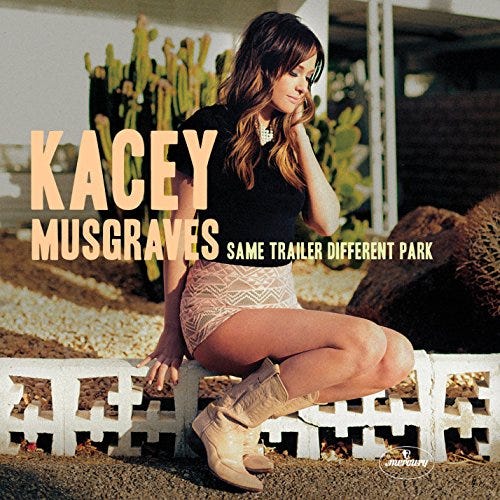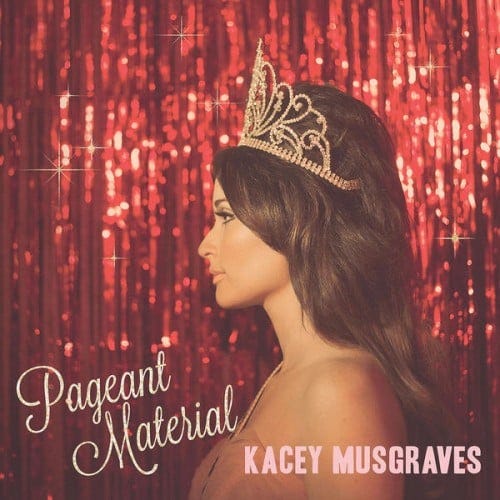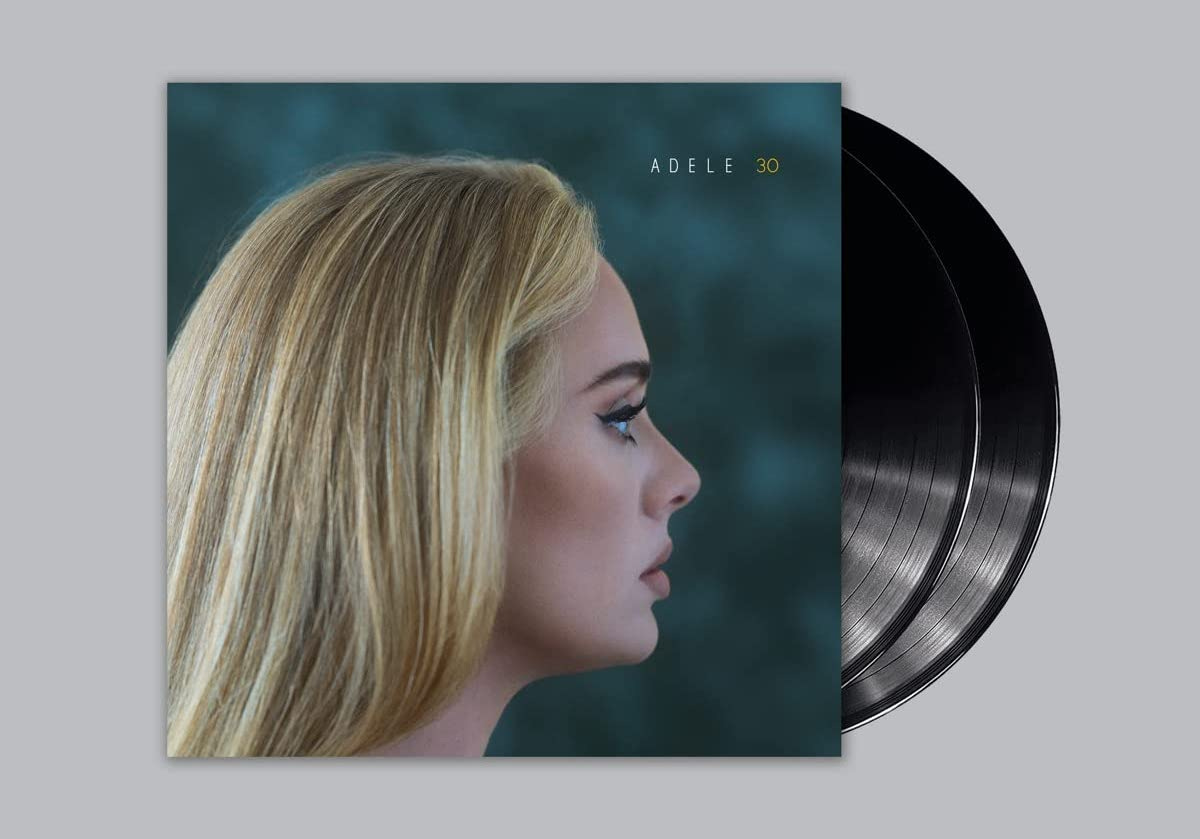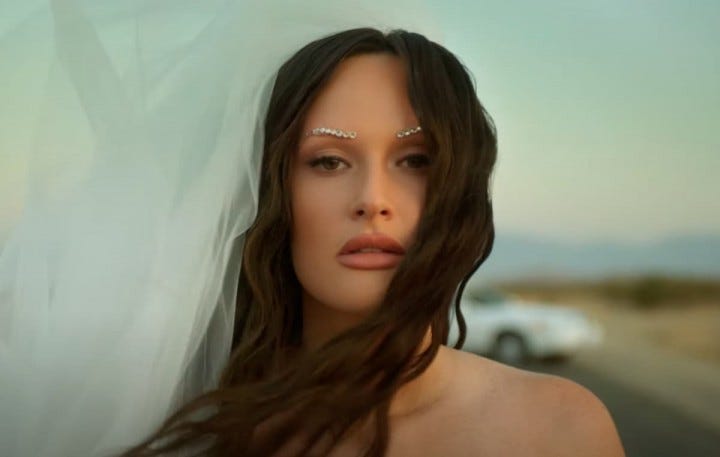kacey musgraves' "Deeper Well" is proof that healing is possible
"I won't break, I'll just sway"
Spring 2024 belongs to the pop girlies, with album releases from Ariana Grande, Shakira, Tyla, and Beyoncé this month, Maggie Rogers and Taylor Swift (*gulp*) in April, and Dua Lipa in May. This week, I’m thrilled to announce that our main girl is Ms. Kacey Musgraves.
I’ve been a fan of Musgraves since 2016, when I was first introduced to her second album Pageant Material (2015). Like Musgraves, I am a Texas girl at heart, and her fresh take on country music spoke to the kind of Southern girl that I fancy myself: Texas, with a twist. Musgraves stirred feathers with her debut album Same Trailer, Different Park and single “Follow Your Arrow,” with a chorus that supports both smoking weed and being gay: “So make lots of noise/ Kiss lots of boys/ Or kiss lots of girls, if that's somethin' you're into/ When the straight and narrow gets a little too straight/ Roll up a joint, or don't/ Just follow your arrow wherever it points.”
In many ways, Musgraves represents a “new” kind of country artist with these progressive politics, but she also speaks to the “old” values that the South and country music are known for: hard-working people making ends meet, small towns, close-knit communities, and simple, everyday desires. In “Biscuits,” Musgraves opens with the lines: “Taking down your neighbor won't take you any higher/ I burned my own damn finger poking someone else's fire/ I've never gotten taller making someone else feel small/ If you ain't got nothing nice to say, don't say nothing at all.” In the chorus, Musgraves tells us, “Mind your own biscuits and life will be gravy.”
Musgraves became well known for this homespun wordplay, which not only speaks to her origins in a small town in Texas, but grants her the credibility to critique the world she came from and the country industry. In “Good Ol’ Boys Club,” Musgraves sings, “Don't wanna be part of the good ol' boys club/ Cigars and handshakes, appreciate you, but no, thanks/ Another gear in a big machine don't sound like fun to me.” Many listeners believe the metaphor of a “big machine” refers to Big Machine Label Group, which is credited with the discovery of Taylor Swift. Since the beginning of her career, Musgraves has been quite bold in her point of view, and in this way shares a lineage with bands like The Chicks and The Highwomen, as well as recent artists like Maren Morris. She represents a small but mighty—and with Beyoncé’s forthcoming album, perhaps a growing—contingent of country music that’s dedicated to showcasing the strengths of Southern experiences while embracing a more equitable future.
Musgraves is at her best, in my opinion, when her lyrics, vocal, and message hum in the sweet spot of loving ambivalence for her world and her experiences. This is perfectly exemplified in her Grammy-winning 2018 album Golden Hour, in the song “Happy & Sad,” when she sings, “Is there a word for the way that I'm feeling tonight/ Happy and sad at the same time/ You got me smiling with tears in my eyes/ I never felt so high.” Musgraves is an artist who has always been both critical and deeply optimistic about her world—whether that be the world of working in a diner, shaking off small-town gossips, or a melancholy ballad about the distance she feels between her and her mother as she’s grown and changed.
It was difficult for Musgraves fans, including myself, to receive her fourth studio album, star-crossed (2021). The highly-anticipated album ostensibly tells the story of Musgraves’ divorce, where Golden Hour narrated the story of Musgraves falling in love with her now ex-husband. In hindsight, I believe Musgraves fell prey to the pressure that the public has stirred up in recent years to produce a “break-up album.” The same fall, Adele released her own so-called divorce album, and later that year, Kelsea Ballerini, another young country star, released her own divorce album. While Ballerini has a significantly smaller following than both Adele and Musgraves, the positioning of the album as a “divorce album” was a timely and smart publicity decision, and speaks to the profitability of divorce as a juicy art-product. The divorce album continued as a chart-topping trend, perhaps reaching its zenith this past Grammy’s cycle with Miley Cyrus’s “Flowers” from the album Endless Summer Vacation.
While the break-up album is a time-honored tradition, with records like Carol King’s Tapestry, Amy Winehouse’s Back to Black, and of course Joni Mitchell’s Blue, the divorce album and anthem has become a powerful trend. We could likely trace the resurgence to Beyoncé’s Lemonade (2016), which while it wasn’t a divorce album narrates a significant and very “adult” relationship betrayal.
I also attribute this trend to Ariana Grande’s thank u next (2018) for its sheer rapid-pace and timely release. In June 2018, Grande got engaged to comedian Pete Davidson, and the couple quickly became a tabloid favorite. Tragically, in September, Grande’s ex-boyfriend Mac Miller died of an accidental overdose. Grande and Davidson broke off their engagement a month later, in October 2018, followed by Grande’s surprise drop, “thank u next,” a mere three weeks later. The song, which references Grande’s past relationships by name, including Davidson, then became a global hit and cultural phenomenon, with a music video wherein Grande inserts herself in iconic films like Legally Blonde and Mean Girls.
But the break-up album is a tough nut to crack, and perhaps the divorce album even more so (we even see this with Grande’s recently released eternal sunshine). Many felt that Musgraves’ star-crossed fell flat, and lacked emotional depth and authenticity. If we think of the visuals from this era, Musgraves was highly stylized in an abrupt departure from her previous eras. In the music video for “Simple Times,” Musgraves appears lacquered and glossy in a metallic vinyl mini skirt. She is flanked by Princess Nokia, a queer Puerto Rican artist, and Symone, a black trans actress. It was clear in this time that Musgraves was experimenting with completing her cross-over to pop music, and considering her difficulties with the country music scene, this made sense. However, it seemed that Musgraves was falling prey to the time-honored formula of white artists appropriating black, brown, and queer aesthetics to signify a new era of their own artistry. In other album visuals, Musgraves also took on some drag make-up aesthetics where she manipulates her eyebrows, which is a common technique used by drag performers.
Overall, I blame star-crossed’s flop on the pressure to create “fast" and “timely art.” At the end of the day, maybe Musgraves just wasn’t ready to make art about her divorce. And I think that’s okay. To write about heartbreak in a truthful way, we need to be able to look at the love that was there in all its complexity, and that’s the kind of perspective that often only comes with time. As I said before, Musgraves is at her best when she takes something perfect and small and speaks to its beauty, hypocrisy, and finitude.
It’s no surprise, then, that I absolutely love her most recent album, Deeper Well, which dropped last night. Long-time fans of Musgraves will know that one of her main music influences is Willie Nelson, and this album, in my opinion, showcases the best of her contributions to the Nelson-country music legacy. She returns to her 70s-vibe in a way that feels comforting while showcasing her lyrical vulnerability and vocal prowess. The stand-out tracks for me are “Sway” and “The Architect,” closely followed by “Moving Out” and “Dinner With Friends.”
The album is melancholy yet deeply hopeful and full of self-compassion. In “Moving Out,” Musgraves sings with the kind of resignation that can only come with time. Simply, she tells us, “I’m kinda sad now that autumn’s moving in/ and we’re moving out.” She tells a story of a home well-worn and well-loved, a tree in the yard that almost crushed her partner’s car. She’s able to face the memories, which the guitar’s reverb echoes in distant and plaintive tones, as she says goodbye to what was.
In “Sway,” the song opens with what sounds like horse hooves galloping forward, while Musgraves tells the listener that, “When the wind blows, it can push you around, it can shake you.” Musgraves takes us to those moments in our lives when something comes and shakes us up, and suddenly we can’t walk or breathe easily. She tells us that sometimes the world around us makes it hard to feel solid. She speculates, “Maybe one day/ I’ll learn how to sway.” Musgraves allows herself to be shaken, unsure of how to move in uncertain times. She allows the listener to see her as imperfect, and struggling. She sings with a wish, “Like a palm tree in the wind/ I won't break, I'll just bend/ And I'll sway/ I'll sway.” Musgraves sings against mastery, and against completion. In one of the most reverent and astonishing moments of the album, Musgraves sings in multi-part harmony with herself, as we hear her layered vocal. In our ears we hear not one Kacey, but four, and five, and six. She has let herself be textured, complex, and in this way undoes the glossy layers of protection she built up for us in star-crossed.
In “Dinner With Friends,” Musgraves offers us a kind of “My Favorite Things” for the modern girl, listing small moments in life that she is grateful for. Musgraves maintains her loving criticism of her home, singing, “My home state of Texas for horses and dogs but none of their laws.” Finally she arrives at her new love: “The cute way he mispronounces certain words/ the smell of his clothes/ the things I would miss/ from the other side.”
In my opinion, “The Architect” is the best depiction of spirituality in pop music today. Musgraves deftly captures a crisis of faith in earnest, curious terms. The song begins, “Even something as small as an apple/ It's simple and somehow complex/ Sweet and divine, the perfect design/ Can I speak to the architect?” The song clearly utilizes Christian cosmology, referencing the Garden of Eden and the Eve’s “apple,” but removes the charged connotations we might have with organized religion. She opens with a curiosity, underscored by the neutral term, “architect.”
What I love about Musgraves is the way that she delivers loss in a song. She sets up the emotional stakes for the listener delicately, taking us further into her world with each verse, until we arrive at a kind of fullness and emotional pay-off. Much like the album title Deeper Well, Musgraves’s writing moves further and further to expose an emotional truth. In the chorus, Musgraves hints at potential danger and disillusionment, “Is there anything that you regret?/ I don’t understand, are there blueprints or plans? Can I speak to the architect?” With each repetition of this question, we move with Musgraves deeper into the heart of her anxiety. In the second verse, Musgraves confesses, “Somеtimes, I look in the mirror/ And wish I could make a rеquest/ Could I pray it away? Am I shapeable clay?/ Or is this as good as it gets?/ One day, you're on top of the mountain/ So high that you'll never come down/ Then the wind at your back carries ember and ash/ That it burns your whole house to the ground.” Here we meet the “wind” from “Sway,” and we learn more about how devastating these circumstances have been for Musgraves. She is a woman whose home and spirit was burnt, and laid bare.
But again, Musgraves takes us to a steady place to land. She sings in the final verse, “I thought that I was too broken/ And maybe too hard to love/ I was in a weird place, then I saw the right face/ And the stars and the planets lined up.” Musgraves moves from discovery, to loss. She narrates how uncertain times can trick us into believing that our circumstances are a reflection of our value. And then she reminds us that even in a “weird place,” we must hold out hope that we are exactly where we need to be.
If there’s one thing I missed in this album, it was the silly and funny Kacey we got to see so much of in Pageant Material, in Golden Hour tracks like “Velvet Elvis,” and even star-crossed’s “breadwinner.” But with the sultry “Lonely Millionaire” and the silly refrains of “Anime Eyes,” as well as the honest and tender places Musgraves took us to, I have faith that we will see her again, perhaps very, very soon. 🌙












🥲🧸
Great "Little Treat" and love the artist. Only wish these country stations could start showing their sisters the same attention as the male artists. Also loved the commentary on breakup albums. As much as I love Adele I couldn't WAIT for her to stop the lost love era of songs.